 Leo Goldsmith
Leo Goldsmith
A continued critique of toxic masculinity and nationalist ideology in the Israeli director’s new feature.
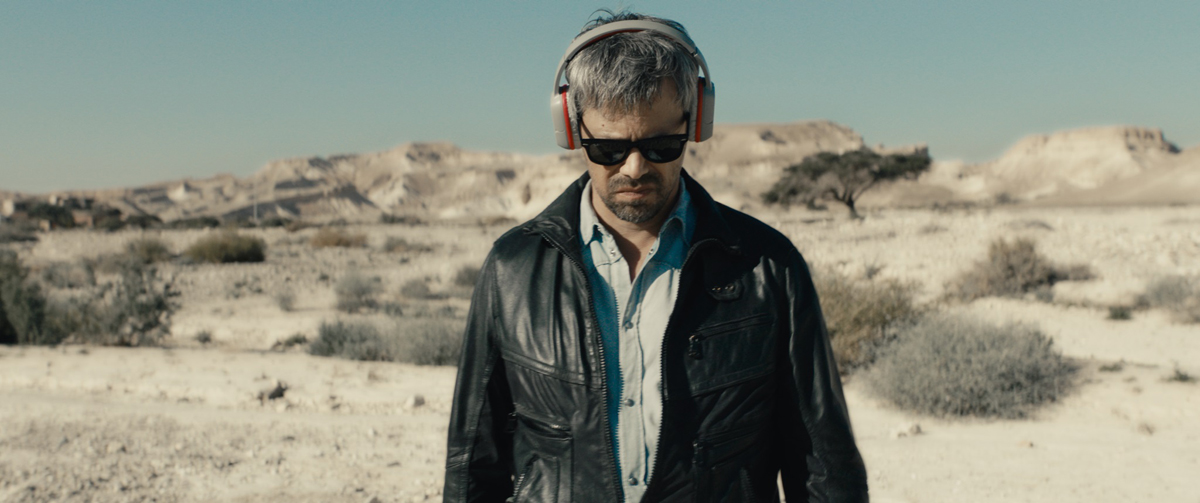
Avshalom Pollak as Y in Ahed’s Knee. Courtesy Cinetic Media.
Ahed’s Knee, written and directed by Nadav Lapid, now playing at
Film at Lincoln Center, New York City
• • •
Apocalypse or depression? That’s the diverting game many have been playing the past couple of years—a constant self-questioning about whether a particular wave of anxiety, inertia, indulgence, or mania is the product of unceasing plague, climate catastrophe, state violence, or impending nuclear holocaust, or is merely, for some of us, a midlife crisis. Not that these are mutually exclusive; as everyone knows, one feeds the other. Second-wave feminism taught us that “the personal is political.” But the hollowing-out of public fora and organizational infrastructure by social media and other mutations of capitalism have tended to emphasize the opposite, reactionary aphorism: “the political is (only) personal.” Mad about what’s going on in the world? Here’s a self-care app to optimize your yoga practice and meditation regime, while you journal in between therapy sessions.
Something of this political impasse is the subject of Nadav Lapid’s new film, Ahed’s Knee, which ponders the crucial question: How do you conscientiously counter the brutal, racist oppression promulgated by an ethno-nationalist state if you’re also a narcissistic asshole? Admittedly, this is not a question on everyone’s lips, but Lapid has thus far made a career of X-raying the toxic-masculine core of Israel, where the filmmaker was born in 1975—even if he’s mostly stopped short of directly addressing the country’s genocidal war against Palestine. His breakout 2011 feature, Policeman, emphasized the aggro sweatiness of two opposing bro-zones: terrorists and counterterrorists. His previous film, 2019’s Synonyms, followed the (spoiler: unsuccessful) attempt of an ex-IDF operative to escape his nationality and the venomous traumas it’s instilled in him and become French. Avowedly, Lapid is less interested in Palestinians themselves than in how they’re reflected in their oppressor. And, at his best, he achieves this with touches that recall James Baldwin’s eviscerating analyses of whiteness—continually emphasizing the boredoms and humiliations (and worse) of compulsory military service, the stultifying effects of nationalist indoctrination, and the ways that these indignities return in the form of aggression, usually against women.
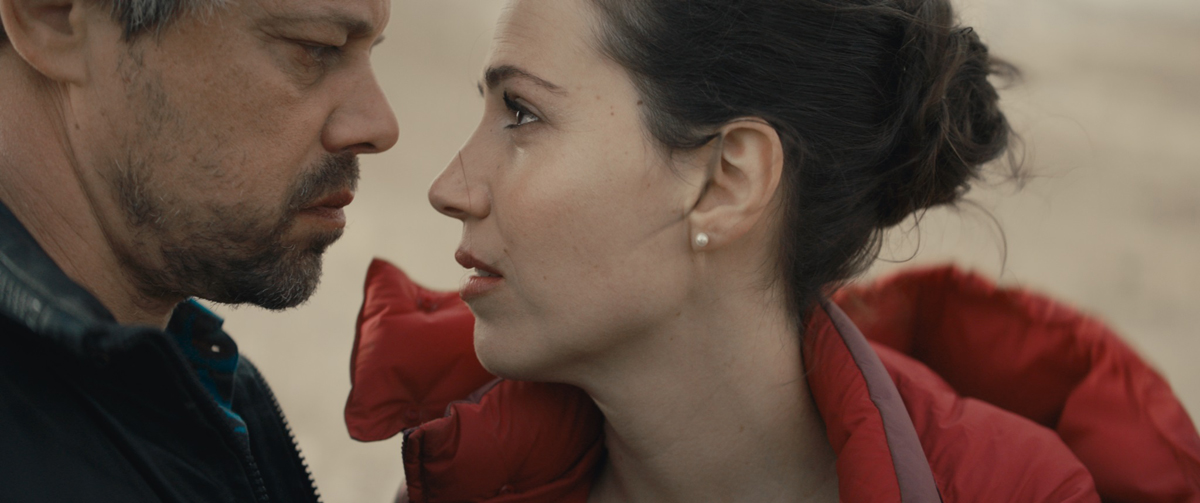
Avshalom Pollak as Y and Nur Fibak as Yahalom in Ahed’s Knee. Courtesy Cinetic Media.
In his latest movie, Palestine is more directly invoked, if only in its title. Yes, this is an Easter egg for you cinephiles out there, nodding to the famous hinge joint in Éric Rohmer’s 1970 film. (Lapid is also canny about inserting himself into the discourse of international art cinema.) But, more to the point, it’s a reference to Ahed Tamimi, the teenage Palestinian activist whose likeness lit up the viral cyberwaves in 2017 when she was filmed slapping and shoving a machine gun–toting Israeli soldier, likely also a teenager. Tamimi, a minor, was arrested in a nighttime raid, jailed for months, and later accepted a plea bargain for which she paid a not-insignificant fine, which did not stop an indignant, far-right Israeli politician, Bezalel Smotrich, from tweeting, “In my opinion, she deserved a bullet, at the very least to the kneecap.” Unlike Claire’s delicate genou in Rohmer’s movie, this patella isn’t so much an object of desire as of violent fantasy—except that, here and always, these two sentiments are so often pathologically intertwined. When we meet the protagonist of Ahed’s Knee—a film director known only as Y (Avshalom Pollak)—in the movie’s opening sequence, he is in the midst of casting the part of the teen activist for his next project (also called Ahed’s Knee). It’s clear the attention he gives to that particular part of the body of the young auditioning actress is similarly, brutally ambivalent.
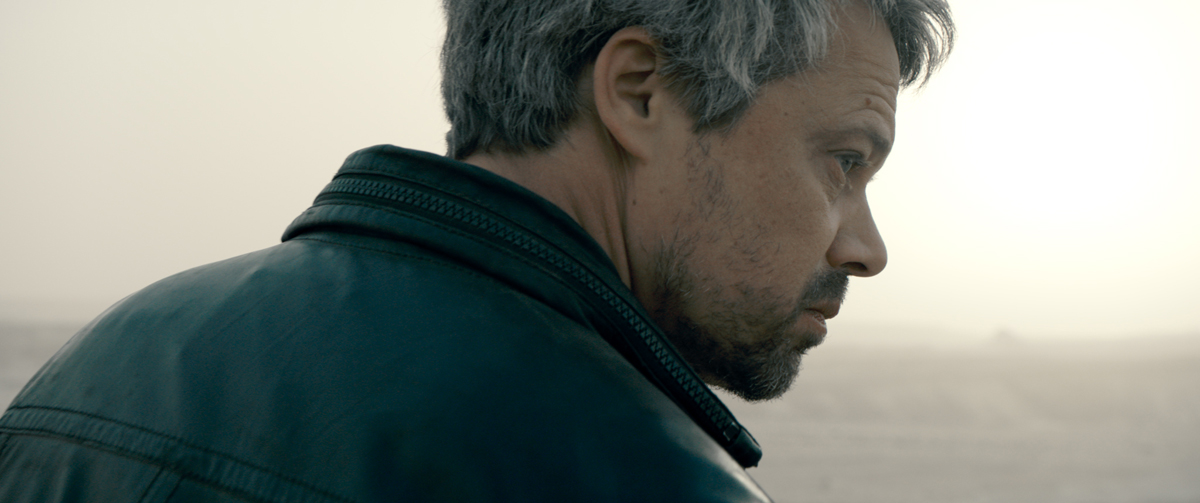
Avshalom Pollak as Y in Ahed’s Knee. Courtesy Cinetic Media.
This first scene is a brief one—Lapid’s smash-cutting and convulsive cinematography are at a fever pitch right from the start—and, before long, the film shifts to its primary location: a small settlement in the Arava, a desert valley extending along Israel’s border with Jordan. It’s a land of overbearing metaphors, where bell peppers rot on the vine and the area’s landmark—dubbed a “miracle in the desert” by the inhabitants—is really just a dry crevasse that, during a flash flood some time ago, drowned a few cows and people. Far from the cosmopolitan center of Tel Aviv, it’s a monochrome hinterland and, to Y’s mind, populated by the kind of conservative-minded bumpkins that drive Israel’s nationalist project. In short, morons.
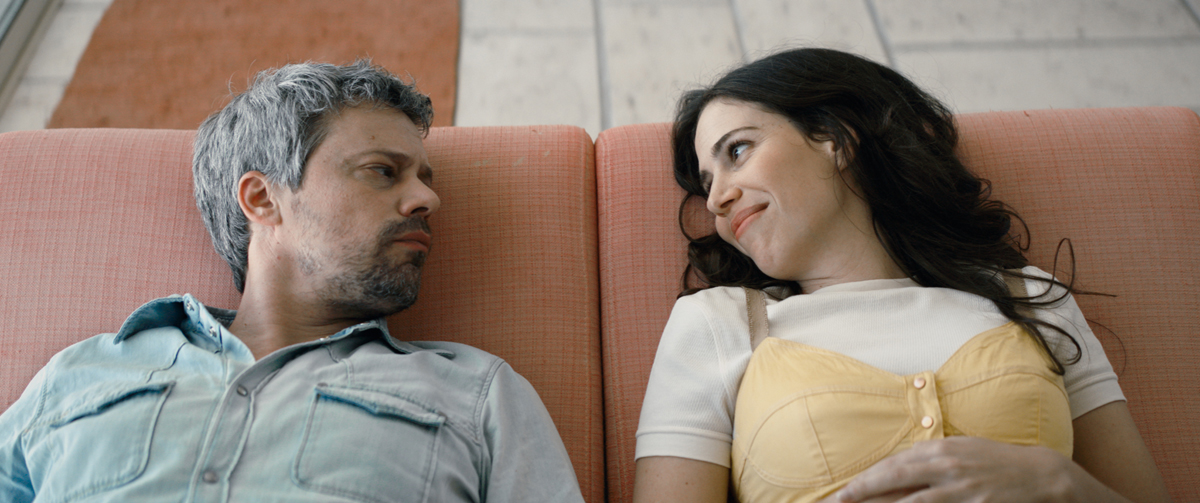
Avshalom Pollak as Y and Nur Fibak as Yahalom in Ahed’s Knee. Courtesy Cinetic Media.
Y has traveled here to present his latest film at the invitation of the Ministry of Culture’s library division, whose deputy director, he’s surprised to find, is not only there to greet him upon arrival but is also a young, attractive woman who may already have a crush on him. Wary of the politics behind this invitation, Y breaks the ice with this junior bureaucrat, Yahalom (Nur Fibak), through what will by the end of the film become a familiar schtick with virtually all the women he meets: barely concealed impatience, relentless questioning, mansplaining, a handful of poetic aphorisms, and a persistent, combative staring-down of his target. From the start, it’s unclear if he means to seduce her or beat her to death. To make matters worse, Yahalom’s offhand insistence that Y fill out and sign a multiple-choice form, confirming the preapproved topics he’ll be addressing in his post-screening Q&A, immediately fills the director with suspicions of censorship. He then spends the next portion of the film concocting an elaborate ruse to entrap the young functionary by forcing her to admit the oppressive, anti-art ideologies behind the form while secretly recording her.
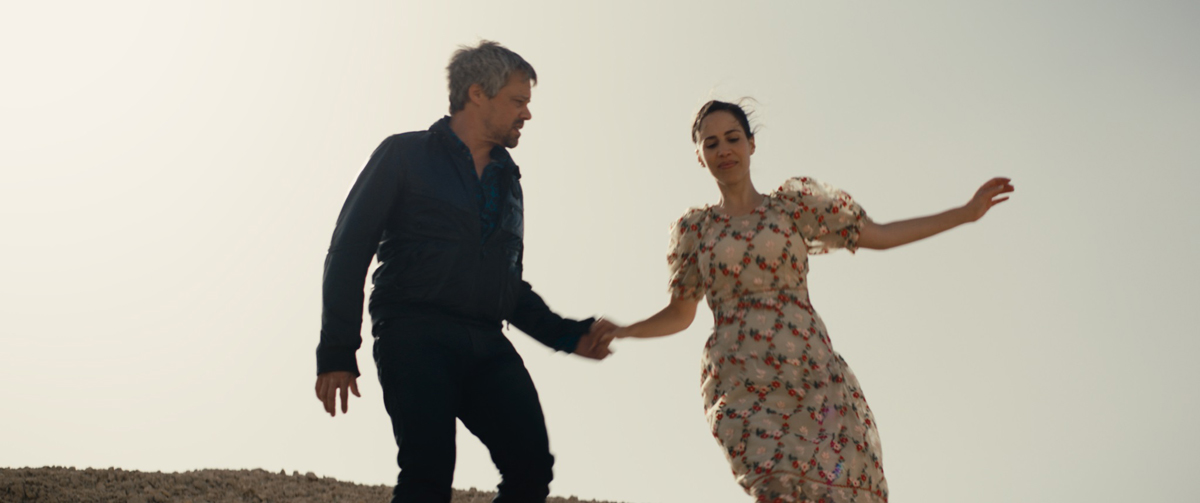
Avshalom Pollak as Y and Nur Fibak as Yahalom in Ahed’s Knee. Courtesy Cinetic Media.
A semi-famous, middle-aged bad-boy director—whose formally and politically daring films, he boasts in a hasty Tinder message, have premiered at Berlin—Y is hard to read as anything other than a self-lacerating autofictional avatar for Lapid himself. This is standard operating procedure for the director, whose earlier films have also featured skewed self-portraits. Lapid redoubles this impression by making Y’s cinematic collaborator and offscreen interlocutor his mother, who is suffering from cancer, an undisguised reference to Lapid’s own mom, Era Lapid, an editor and consultant on her son’s previous work who died before Synonyms was completed. As if to emphasize this uncomfortable proximity, Shai Goldman’s camerawork—which has become increasingly manic over the course of his collaborations with Lapid—repeatedly takes on a kind of wild, disembodied POV until it is, by film’s end, practically lodged in Y’s nostril. All of Lapid’s films thus far have captured the male form adeptly and sensuously, but here—as in the pro forma art-film sequence of Y dancing to an obscure pop song (in this case, Vanessa Paradis’s “Be My Baby”)—the cinematography, which is closer to an extreme-sports vomit cam, does Pollak’s strident and aptly vulgar lead performance no favors.

Still from Ahed’s Knee. Courtesy Cinetic Media.
Such a gesture of deprecatory self-portraiture is not in itself unusual, of course. But in Ahed’s Knee it has the effect of undermining the film’s aspirations to trenchant social critique, rendering it instead a kind of bathetic self-parody. All of this is of a piece with Lapid’s larger project of holding up a mirror to the Israeli state, its blinkered perspectives and deep hypocrisies. But it also conveys the simplistic sense that the largest issues of the day—of institutionalized violence, oppression, and social stratification—are mere personal pathologies. Isn’t the point not to free your mind, but to free Palestine?
Leo Goldsmith is a writer, teacher, and curator based in Brooklyn.